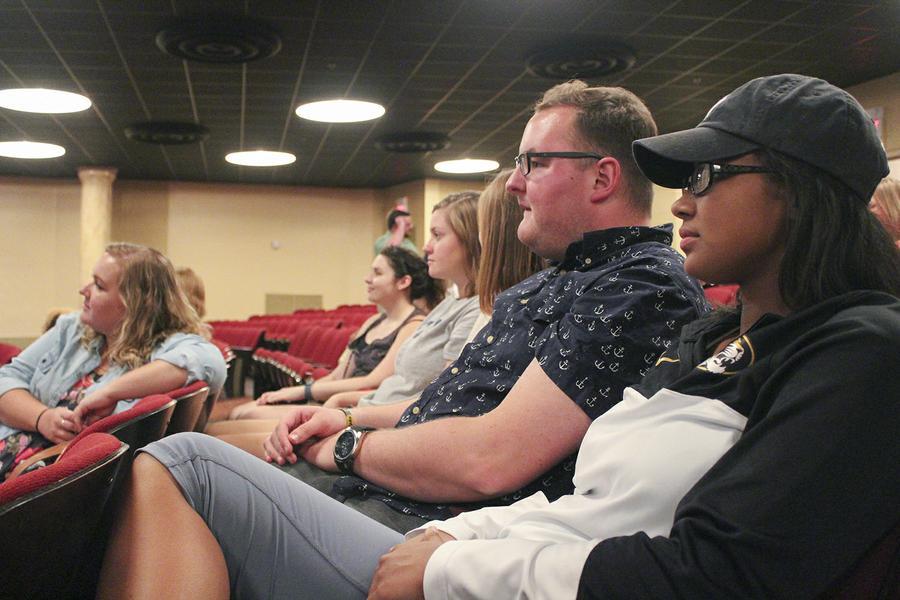
When the lights came back on in the Jesse Auditorium at the end of the showing of the film “The Hunting Ground,” the entire auditorium was silent. Danica Wolf, the Relationship and Sexual Violence Prevention Center Coordinator, came onstage to address the crowd.
“I feel like we all need a moment to exhale,” she said. “It doesn’t matter how many times I see that ending or hear that music. I still get goosebumps.”
The film is an exposé of rape on college campuses that emphasized the efforts universities made to cover up sexual violence. It argued that the visibility of sexual assault could negatively impact admissions as well as the lucrative college athletic systems. Therefore, colleges often disregard the safety of survivors and potential future victims for their own self-interest.
The film was shown Sept. 17 as a part of Safety Week and was put on by the Safe Mizzou Coalition, the MSA/GPC Films Committee, the Women’s Center, the RSVP Center, the Department of Student Life and the Title IX Office. The event’s purpose was to inform students about sexual assault on college campuses — including our own.
“I want them to know that sexual assault occurs on college campuses,” Title IX Administrator Ellen Eardley said. “It occurs here at Mizzou. When students stand up against that, it makes a difference.”
Graduate student Josephine Smiley said she was happy to see discussion taking place regarding the issue of campus sexual violence.
“I was involved in activism along those lines at my undergraduate institution, so I already knew about the epidemic,” Smiley said. “My reaction was that this is a really good representation of what goes on at a lot of colleges.”
Smiley attended Hanover College, where she said sexual violence was prevalent on campus. She said it is a good sign that MU was taking steps to fix the climate universal to most campuses.
“I know Mizzou is already doing a lot better than Hanover, first of all with the resources available and the education,” she said. “I had to take a Title IX class before registering for classes, which is great. I was very pleased to see that they did that.”
MU has taken steps in the past year to address sexual violence on campus. Chancellor R. Bowen Loftin released a directive last year to reorganize the way the university handles sex discrimination claims. The Title IX Office, now just over a year old, hired three new Title IX investigators and a case manager, and is looking to hire an education and intervention specialist, Eardley said.
The RSVP Center, which the Title IX Office works closely with, also expanded by hiring a full-time prevention coordinator, an education coordinator and an advocate. All of those jobs were formerly performed by one person, RSVP Center Education Coordinator Kim Scates said.
“(The former coordinator) did all of those jobs in an amazing way,” Scates said. “I can’t think of one person who could do all four of those positions better than she did, but you’re limited with how far you can reach.”
In light of the new growth, Scates said the organization’s goal this year was to “reach more of campus with that message” about power-based sexual violence. Prevention strategies at the RSVP Center include education and the Green Dot program — a method of bystander intervention. The center also advocates for survivors of sexual violence.
Another recent change is the implementation of the [Not Anymore](https://www.themaneater.com/stories/2015/9/17/not-anymore-training-reveals-need-education/) program this year, which is required of all incoming students.
“The Not Anymore training provides such a good baseline for us to have these conversations,” Eardley said. “It improves and enriches our ability to do the education work that we’re doing. We will look at the completion rates, and we’re going to have small group discussions about what students thought about it and what we can do to improve that tool in the future.”
With these changes, administrators hope to make MU the exception when it comes to handling sexual assault.
“It is our hope, our goal, that the kinds of failures (to address campus sexual assault) that you saw in that movie do not happen at Mizzou,” Eardley said.
One failure featured in the movie was underreporting. The movie cited a statistic that 45 percent of universities reported zero sexual assaults in 2012. In contrast, the Title IX office released their [first annual report](http://title9.missouri.edu/documents/2014-2015-Annual-Report-MU-Title-IX-Office.pdf) last week, which states that 65 students reported sexual assault at MU.
To ensure that MU doesn’t make those failures, Eardley calls upon students to hold the university and her office accountable.
“I think they should speak out when they feel that either the Title IX Office or the administrators have done something that is inexcusable or not in line with our principles of respect and inclusion,” she said.
After the movie, Wolf said her goal for the RSVP Center was for them to eventually “put themselves out of business.”
“You wouldn’t all be sitting here if you didn’t think it was possible,” Wolf said.
While students like Smiley are happy to see changes being made, the results have yet to be seen. Smiley, for one, was unable to say whether events such as the showing of “The Hunting Ground” made her feel safer on campus.
“I mean, I carry pepper spray everywhere,” she said. “As far as feeling safe, it’s hard to say.”